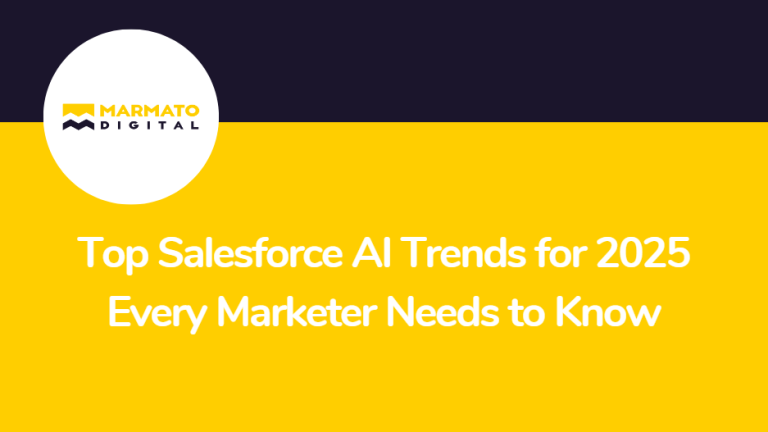If you’re a marketer looking to stay ahead of the curve in 2025, understanding how Salesforce is using AI can help you lead the way. Salesforce, one of the world’s most powerful marketing platforms, is constantly evolving. Its AI-powered tools, especially Einstein and Einstein GPT, are giving marketers new ways to connect with customers, personalize content, and make data-driven decisions faster than ever before. In this blog, we’ll explore the top Salesforce AI trends that every marketer should be watching in 2025.

Top Salesforce AI Trends for 2025:
1. Generative AI for Smarter, Faster Content Creation:
Creating content takes time, but what if AI could write emails, product descriptions, or ad copy for you? With Salesforce’s Einstein GPT, this is now a reality.
Einstein GPT uses generative AI to help marketers quickly draft personalized messages, headlines, and even images. It can also suggest content ideas based on customer behavior or past campaign performance.
Why it matters:
- Speeds up content production.
- Helps deliver personalized messages at scale.
- Reduces creative bottlenecks, especially for small teams.
Focus on:
- Prompt engineering: Learn how to write effective prompts for Einstein GPT to get high-quality content suggestions.
- Brand voice consistency: Train the AI on your brand guidelines to keep messaging consistent.
- Review workflows: Always have human oversight for content generated by AI to ensure accuracy and compliance.
- Integration: Make sure AI tools are connected to your CRM, CMS, and email platforms for smooth content deployment.
2. Predictive Insights to Improve Campaign Performance:
Imagine knowing which leads are likely to convert or which customers might unsubscribe, before it happens. That’s what predictive AI in Salesforce does.
Salesforce Einstein can analyze customer data and past behaviors to predict future actions. It gives marketers insights such as:
- Which emails will likely be opened?
- Which customers are ready to buy?
- When to reach out to maximize engagement.
Why it matters:
- Helps marketers make smarter decisions.
- Reduces guesswork in campaign planning.
- Increases return on investment (ROI).
Focus on:
- Clean, unified data: AI is only as good as the data it learns from. Ensure your customer data is complete and well-organized.
- Lead scoring models: Use AI-powered scoring to prioritize the most sales-ready leads.
- Behavior tracking: Set up events and actions (like clicks or form fills) that trigger predictive models.
- Continuous learning: Monitor how predictions align with real outcomes and adjust inputs as needed.
3. Real-Time Personalization at Scale:
Today’s customers expect a personalized experience, not a one-size-fits-all message. Salesforce AI allows marketers to create real-time personalized experiences based on what users are doing right now.
For example, if a customer browses a product page, Salesforce can instantly trigger a follow-up email with related items or a limited-time discount.
Why it matters:
- Increases engagement and conversion rates.
- Makes customers feel seen and valued.
- Helps build brand loyalty.
Focus on:
- Customer journey mapping: Understand key moments where personalization has the biggest impact.
- Dynamic content setup: Use Salesforce Marketing Cloud to create content blocks that change based on user behavior.
- Speed and responsiveness: Ensure your systems can handle real-time decision-making without delay.
- Omnichannel coordination: Deliver consistent personalization across email, web, mobile, and ads.
4. AI-Powered Segmentation and Targeting:
Finding the right audience for each message is key to any campaign’s success. With AI, Salesforce can automatically segment audiences based on customer actions, preferences, and purchase history.
Instead of manually building lists, marketers can let Einstein AI create smart segments that update in real time.
Why it matters:
- Saves time and reduces human error.
- Ensures more relevant messaging.
- Improves campaign results with targeted outreach.
Focus on:
- Behavioral data: Use AI to group audiences based on clicks, time on site, purchases, etc.
- Predictive attributes: Go beyond basic demographics, let AI uncover hidden patterns in your audience.
- Smart lists: Automate list building and ensure segments update in real time.
- Testing & refining: Continuously test new segments and measure performance against goals.
5. Smarter Revenue Forecasting and Attribution:
One of the biggest challenges for marketers is proving their impact on revenue. Salesforce AI is changing that by offering advanced attribution models and revenue forecasting tools.
These tools help marketers:
- Track which campaigns lead to actual sales.
- Measure the value of each customer touchpoint.
- Forecast future revenue based on past and current data.
Why it matters:
- Helps CMOs and CROs make better budget decisions.
- Aligns marketing efforts with business goals.
- Makes it easier to report ROI to leadership.
Focus on:
- Attribution models: Understand which model (first-touch, last-touch, multi-touch) works best for your business.
- Sales & marketing alignment: Ensure both teams agree on KPIs and data sources used for forecasting.
- Pipeline visibility: Use AI to flag risks and opportunities in your sales funnel.
- ROI dashboards: Build easy-to-read reports that tie marketing activities directly to revenue outcomes.
Conclusion:
AI is no longer optional for marketers; it’s essential. Salesforce is making it easier than ever to use AI in everyday marketing tasks, from content creation to revenue tracking. By embracing these trends now, marketers can stay competitive and deliver more value to their teams and customers.
Ready to Make the Most of Salesforce AI in 2025?
Subscribe to Newsletter
Get our latest blogs directly to your inbox.

